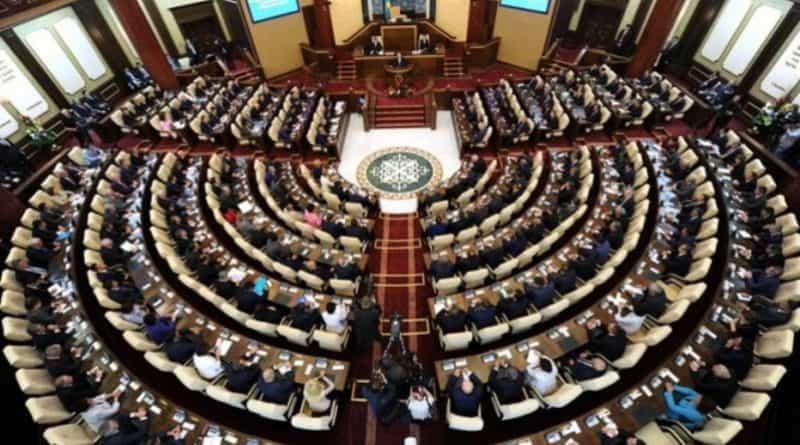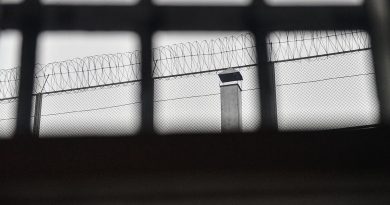Kazakhstan: After protests, parliamentary journalists were returned to their places
Kazakhstan’s capital journalists have won a small victory in the fight against the deputies of Parliament. After the scandal, media workers were again allowed to work in a way that was convenient for them, and not for parliamentarians.
On April 14, new rules for the media began to operate in the Parliament building. The press center, where journalists watched the work of the deputies through monitors, was moved to the basement, where there was a poor connection. Operators and photojournalists were limited to work during meetings of deputies for 10 minutes. And journalists were forbidden to catch not only deputies, but also members of the government in the corridors of Parliament in order to ask them questions of interest to the public. Moreover, the Parliament allotted a special place for express briefings, enclosed with red tape, so that journalists couldn’t get closer to the speakers by more than 1.5-2 meters.
The journalists, who cover the work of the Parliament and government of Kazakhstan, considered these innovations as a violation of their professional rights.
“Members of Parliament once again decided to teach journalists the culture of communication with deputies. It’s for this purpose that new rules of conduct for journalists in Parliament have been adopted. According to people’s deputies, it will be very cultural if journalists are NOT able to:
– show the public how deputies behave during meetings (it turns out that until now cameramen have prevented deputies from concentrating on bills, but 10 minutes it’s quite possible to be patient and behave respectably without looking at phones and without yawning);
– interview individually (from now on – only in a crowd behind a red ribbon with a single microphone). It’s very convenient, they can ‘not hear’ unpleasant questions;
– run after the deputies, watch for them at the elevators and in the buffets, pumping an information out of them. Now people with deputy badges can no longer hide at the sight of microphones, but pass by with dignity, as if past a waste of space.
The upper House of Parliament went even further in forcing journalists to culture. There, the press center was moved to the basement, where there is no mobile connection, there are not enough working places, but there is an abundance of kitchen aromas from the canteen nearby,” the innovations were criticized by the International Foundation for the defense of freedom of speech “Adil soz”.
Moreover, the Foundation, together with the Union of journalists of Kazakhstan, addressed an open letter to the speakers of Parliament and the Minister of Information and Social Development “On the inadmissibility of restricting the work of journalists in Parliament”.
“We would like to remind respected deputies of the words of the President of the country, Kassym-Jomart Tokayev, from the recent Address New Kazakhstan: the path of renewal and modernization: ‘The state will pay special attention to creating an open information space, popular and strong media. Representing an effective channel of communication between the authorities and the people, the media can and should raise pressing issues.’ We believe that the introduction of these rules is a manifestation of disrespect for the media as a public institution, which is entrusted with the most important social functions, and for journalists as its employees. We ask you to cancel them as restricting the public’s right to receive reliable information and preventing the strengthening of trust in the authorities and society,” the appeal states.
And now, after 5 days, the battle of journalists with the Parliament ended in victory for the journalist, and the deputies capitulated.
“Since last week, the Senate (the upper House of the Parliament of Kazakhstan) has a new practice – all ministers and deputies, reporting at the meeting, must participate in briefings. Asking questions and answering them in a calm atmosphere is more convenient for journalists, cameramen, and for the speakers themselves than doing it while running, somewhere in an elevator, etc. Next to the briefing area, we organized a new press center, but the journalists considered that the former location of the press center was more convenient. Senate speaker Maulen Ashimbaev then listened attentively to all the journalists’ comments, promised to look into it and instructed us to work on this issue. The position of the speaker is to provide journalists with the opportunity to work where they are more comfortable. In this regard, today’s news is that the press center is returning to the premises where it was located earlier,” Daniyar Ramazanov, press secretary of the Senate, wrote on social networks.
At the same time, he stressed that the Parliament doesn’t intend to refuse briefings. They will be held not in a specially designated place with red ribbons, but ‘where it’s more convenient for journalists – in the hall near the meeting room’.
“Engineering services are already preparing the technical equipment of the site for their implementation. Taking this opportunity, I want to once again turn to my colleagues: all this is done to ensure that journalists have interviews full of content, cameramen have high-quality pictures, light and sound, photographers have a good position, and so on. There was no talk of any restrictions on the access of journalists to any deputies, ministers, and cannot be. The openness of Maulen Ashimbaev, his constant interviews and answers to pressing questions are proof of this. I am sure that such an environment, where journalists can ask questions and receive detailed answers without pushing each other and the speakers, will help in preparing high-quality materials,” Ramazanov explained.




